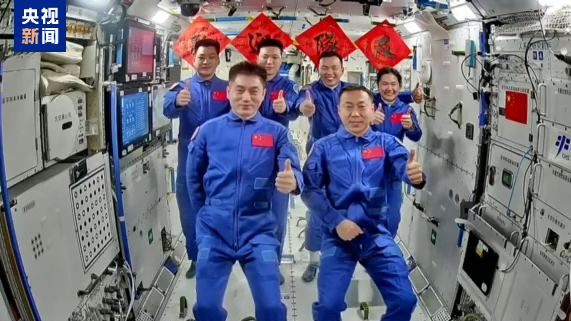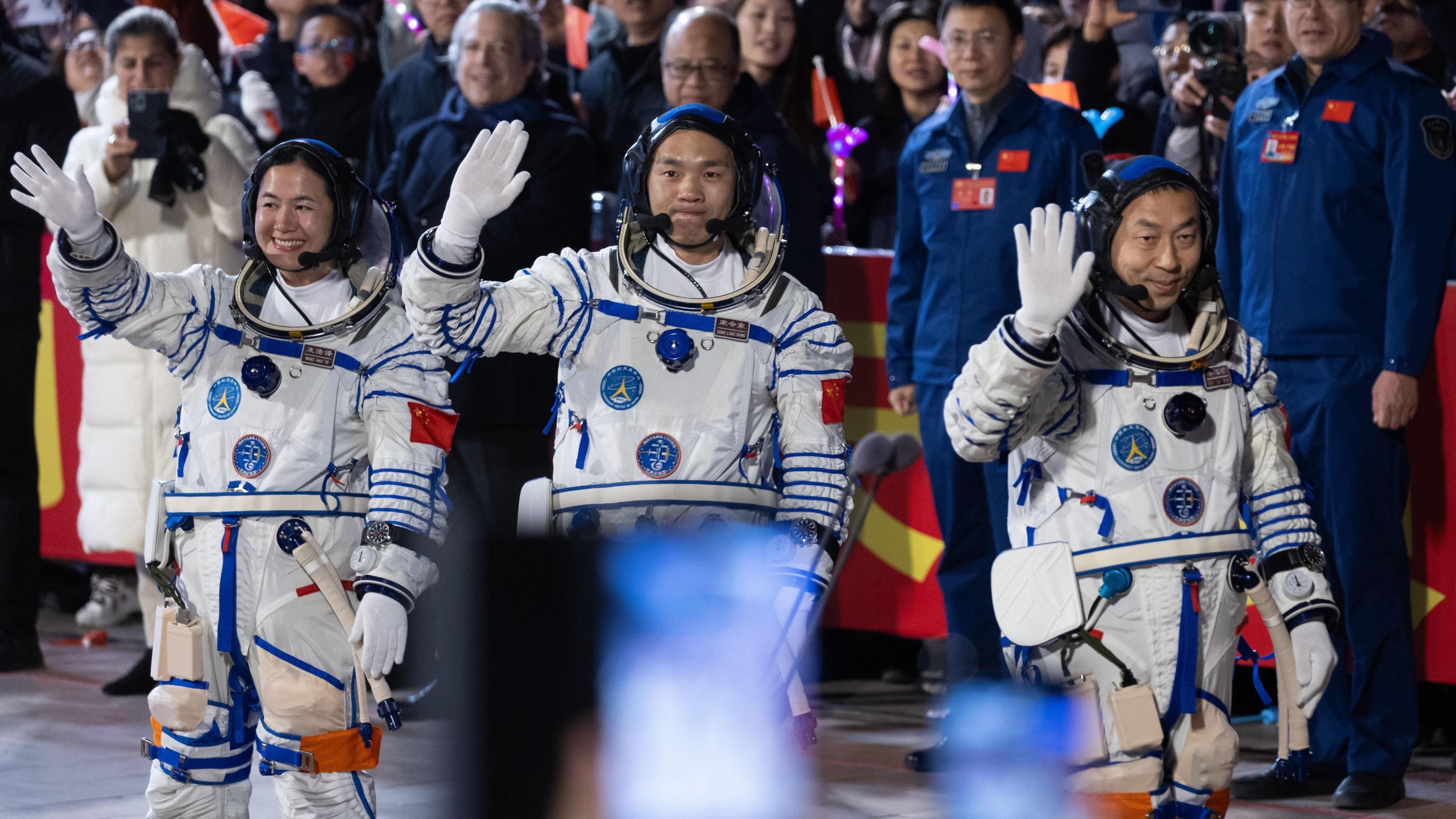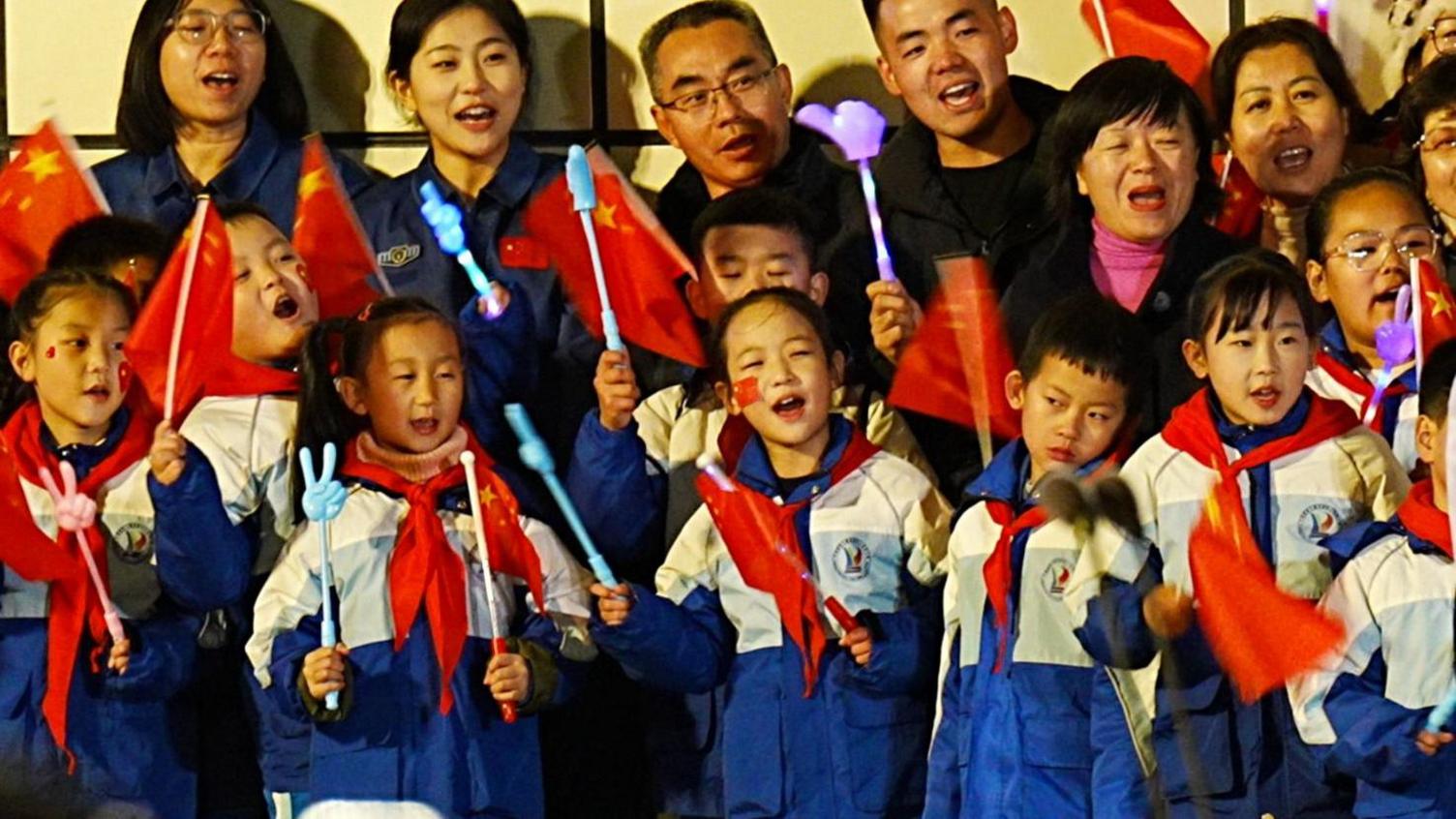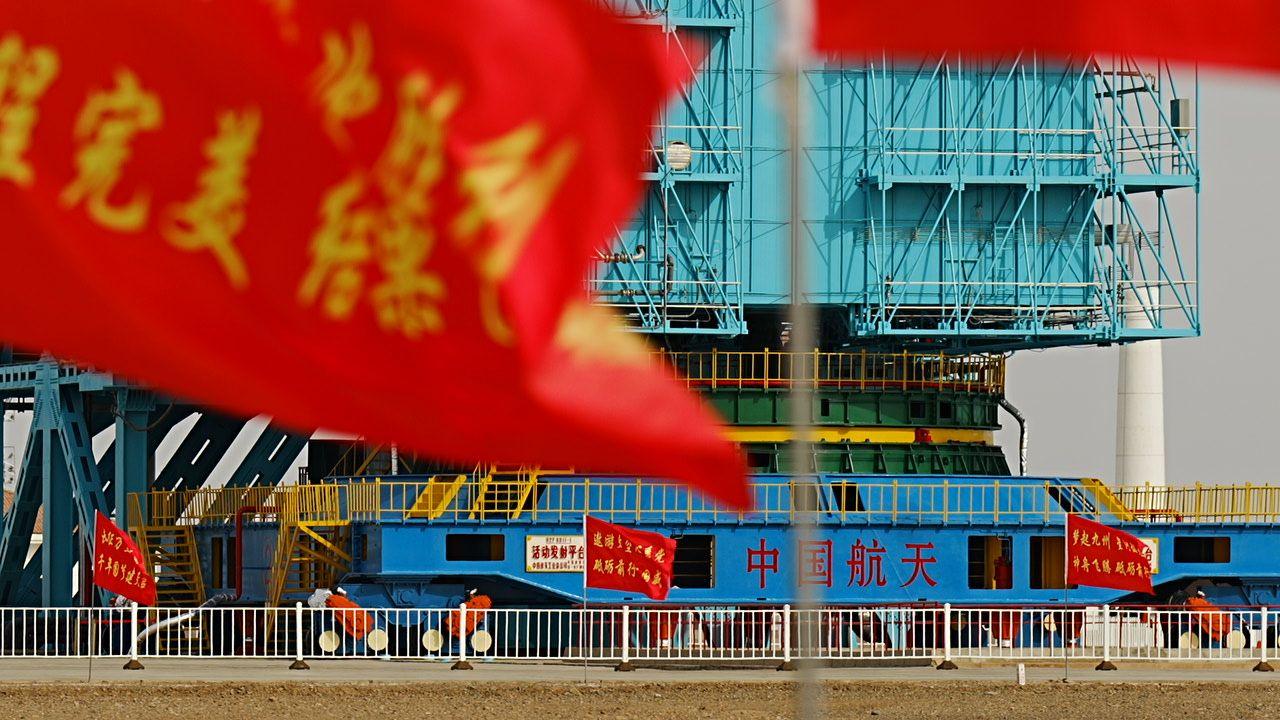中国宣布最年轻宇航员成功进入太空
China declares success as its youngest astronauts reach space

China spacecraft launches in mission to space station
A Chinese spacecraft with a three-person crew, including the country's first female space engineer, has docked after a journey of more than six hours.
The crew will use the homegrown space station as a base for six months to conduct experiments and carry out spacewalks as Beijing gathers experience and intelligence for its eventual mission to put someone on the Moon by 2030.
Beijing declared the launch of Shenzhou 19 a "complete success" - it is one of 100 launches China has planned in a record year of space exploration as it tries to outdo its rival, the United States.
The BBC was given rare access to the Jiuquan Satellite launch centre in Gansu and we were just over a kilometre away when the spacecraft blasted off.
Flames shot out of the rocket launcher as it took to the skies, lighting up the Gobi Desert with a deafening roar.
Hundreds of people lined the streets, waving and cheering the names of the taikonauts, China’s word for astronauts, as they were sent off.
At the Tiangong space station, the Shenzhou 19 crew met with three other astronauts who are manning the Shenzhou 18 and will return to Earth on 4 November.
Just two years ago, President Xi Jinping declared that "to explore the vast cosmos, develop the space industry and build China into a space power is our eternal dream”.
But some in Washington see the country’s ambition and fast-paced progress as a real threat.
Earlier this year, Nasa chief Bill Nelson said the US and China were “in effect, in a race” to return to the Moon, where he fears Beijing wants to stake territorial claims.
He told legislators that he believed their civilian space programme was also a military programme.
The Shenzhou 19 crew took a group photo onboard with three other astronauts who are manning the Shenzhou 18
'Dreams that spark glory'
However, in Dongfeng Space City, a town built to support the launch site, China’s space programme is celebrated.
Every street light is adorned with the national flag.
Cartoon-like astronaut figurines and sculptures sit in the centre of children’s parks and plastic rockets are a centrepiece on most traffic roundabouts.
A huge poster with Xi Jinping on one side and a photo of the Shenzhou spacecraft on the other greets you as you drive into the main compound.
Hundreds have gathered in the dark after midnight to wave flags and brightly coloured lights as the Taikonauts make their last few steps on Earth before heading to the launch site.
The brass band strikes up Ode to the Motherland as young children, kept up late for the occasion, their cheeks adorned with the Chinese flag, all shout in full song.
This is a moment of national pride.
The pilot of this mission, Cai Xuzhe, is a veteran but he’s travelling with a new generation of Chinese-trained taikonauts born in 1990 – including China’s first female space engineer, Wang Haoze.
“Their youthful energy has made me feel younger and even more confident,” he told the gathered media ahead of take-off.
“Inspired by dreams that spark glory, and by glory that ignites new dreams, we assure the party and the people that we will stay true to our mission, with our hearts and minds fully devoted. We will strive to achieve new accomplishments in China’s crewed space programme.”
Standing to his left, beaming, is Song Lingdong.
He recalls watching one of China’s first space station missions as a 13-year-old with “excitement and awe”. He chose to become a pilot in the hope that this is how he could serve his country.
All three convey their deep sense of national pride, and state media has emphasised that this will be its “youngest crew” to date.
The message is clear: this is a new generation of space travellers and an investment in the country’s future.
China has already selected its next group of astronauts and they will train for potential lunar missions as well as to crew the space station.
“I am determined not to let down the trust placed in me,” says Mr Song. “I will strive to make our country’s name shine once again in space.”
Astronauts (L-R) Wang Haoze, Song Lingdong and Cai Xuzhe wave before the launch
China’s name has been "shining brightly" a lot lately when it comes to headlines about its space programme.
Earlier this year, the country achieved a historic first by retrieving rock and soil samples from the far side of the Moon.
In 2021, China safely landed a spacecraft on Mars and released its Zhurong rover – becoming just the second nation to do so.
China also has a fleet of satellites in space and has plans for many more.
In August it launched the first 18 of what it hopes will eventually be a constellation of 14,000 satellites providing broadband internet coverage from space, which it hopes will one day rival SpaceX’s Starlink.
Elon Musk, Starlink's chief executive, admitted on his own platform X that China’s space programme is far more advanced than people realise.
But others in the US are voicing even greater concerns, as they fear this technology can be weaponised.
The head of US Space Command, General Stephen Whiting, told a space symposium in April that China and Russia were both investing heavily in space at a “breath-taking speed”.
He claimed that since 2018, China has tripled the amount of intelligence, surveillance and reconnaissance satellites it has in orbit, building a “kill web over the Pacific Ocean to find, fix, track and target United States and allied military capabilities”.
Young children, their cheeks adorned with the Chinese flag, all shout in full song as they send the crew off
The new space race
China’s space exploration is a “collective mission for humanity”, says Li Yingliang, director of the general technology bureau of China’s Manned Space Agency, dismissing US concerns as “unnecessary”.
“I don’t think this should be called a competition… China has long upheld the notion of peaceful use of space in its manned space programme. In the future, we will further develop international co-operation in various aspects of manned space technology, all based on sharing and collaboration,” he adds.
But the new space race is no longer about getting to the Moon. It’s about who will control its resources.
The Moon contains minerals, including rare earths, metals like iron and titanium - and helium too, which is used in everything from superconductors to medical equipment.
Estimates for the value of all this vary wildly, from billions to quadrillions. So it’s easy to see why some see the Moon as a place to make lots of money. However, it’s also important to note that this would be a very long-term investment - and the tech needed to extract and return these lunar resources is some way off.
Chinese experts at the launch centre were keen to point out the benefits of Beijing’s space station experiments.
“We study bones, muscles, nerve cells, and the effects of microgravity on them. Through this research, we’ve discovered that osteoporosis on Earth is actually similar to bone loss in space. If we can uncover unique patterns in space, we might be able to develop special medications to counteract bone loss and muscle atrophy,” said Zhang Wei, from the Chinese Academy of Sciences.
“Many of these experimental results can be applied on Earth.”
China is, at times, trying to downplay its advances.
At the launch of a roadmap for its space ambitions, which include building a research station on the Moon, returning samples of Venus’s atmosphere to Earth and launching more than 30 space missions by the middle of this century, Ding Chibiao from the Chinese Academy of Sciences said the country did not have a great number of achievements “compared to developed nations”.
China has planned 100 launches in a record year of space exploration as it tries to outdo its rival, the United States
And even here at the launch centre, they admit to “significant challenges” as they try to land a crew on the Moon.
“The technology is complex, there's a tight schedule, and there are a lot of challenges,” said Lin Xiqiang, spokesperson for the China Manned Space Agency.
“We'll keep up the spirit of 'two bombs and one star'. We will maintain our self-confidence and commitment to self-improvement, keep working together and keep pushing forward. We'll make the Chinese people's dream of landing on the Moon a reality in the near future.”
That’s perhaps why President Xi appears to be prioritising the country’s space programme even as the economy is in a slow decline.
And even though they are bringing along international press to witness their progress – there are key restrictions.
We were kept in a hotel three hours from the launch site and transported back and forth by bus, a total journey of 12 hours, rather than being left on site for a few hours.
A simple trip to a friendly local restaurant was carefully guarded by a line of security personnel.
镇上的一块大型标牌上写着严厉的警告:Zhèn shàng de yīkuài dàxíng biāopái shàng xiězhe yánlì de jǐnggào:
“泄露机密是犯罪。“Xièlòu jīmì shì fànzuì.
保守机密是一种荣誉。Bǎoshǒu jīmì shì yī zhǒng róngyù.
泄露机密你会被判入狱。Xièlòu jīmì nǐ huì bèi pàn rù yù.
保守机密你会感到快乐。Bǎoshǒu jīmì nǐ huì gǎndào kuàilè.
出卖机密你会被枪毙。” Chūmài jīmì nǐ huì bèi qiāngbì.”
We also noticed a large sign in town holds a stern warning: “It’s a crime to leak secrets. It’s an honour to keep secrets. You’ll be jailed if you leak secrets. You’ll be happy if you keep secrets. You’ll be shot if you sell secrets.”
China is taking no chances with its new technology, as its rivalry with the United States is no longer just here on Earth.
The world’s two most powerful countries could soon be staking territorial claims well beyond this planet.
🇨🇳
中国宣布其最年轻的宇航员成功进入太空
中国航天器发射升空,执行空间站任务
甘肃酒泉卫星发射中心。
2024 年 10 月 29 日
一艘载有三名机组人员的中国航天器经过六个多小时的旅程已停靠,其中包括该国首位女性太空工程师。
机组人员将使用国产空间站作为基地进行六个月的实验和太空行走,北京将积累经验和情报,最终在 2030 年前将人送上月球。
北京宣布神舟十九号发射“圆满成功”——这是中国在创纪录的太空探索之年计划的 100 次发射之一,中国正试图超越其竞争对手美国。
BBC 获得了甘肃酒泉卫星发射中心的罕见采访机会,当航天器升空时,我们距离发射中心仅一公里多一点。
火箭发射升空时,火焰从火箭发射装置中喷涌而出,震耳欲聋的轰鸣声照亮了戈壁沙漠。
数百人站在街道两旁,向送别的宇航员挥手致意,欢呼他们的名字。
在天宫空间站,神舟十九号机组人员与另外三名驾驶神舟十八号的宇航员会面,他们将于 11 月 4 日返回地球。
就在两年前,习近平主席宣布“探索浩瀚宇宙,发展航天工业,把中国建设成航天强国,是我们永恒的梦想”。
但华盛顿的一些人认为,中国的雄心和快速发展是一个真正的威胁。
今年早些时候,美国宇航局局长比尔·尼尔森表示,美国和中国“实际上在进行一场重返月球的竞赛”,他担心北京想在那里宣示领土主权。
他告诉立法者,他认为他们的民用航天计划也是一项军事计划。
神舟十九号机组人员在飞船上与另外三名驾驶神舟十八号的宇航员合影
“梦想点燃荣耀”
然而,在为支持发射场而建的东风航天城,中国的航天计划受到了赞扬。
每盏路灯都装饰着国旗。
卡通般的宇航员小雕像和雕塑坐落在儿童公园和塑料游乐场的中心 火箭是大多数交通环岛的焦点。
当您驾车驶入主院时,一面是习近平的巨幅海报,另一面是神舟飞船的照片,映入眼帘。
午夜过后,数百人聚集在一起挥舞旗帜和色彩鲜艳的灯光,宇航员在前往发射场之前在地球上迈出最后几步。
铜管乐队奏响《歌颂祖国》,小孩子们为了这一天熬夜不眠,他们的脸颊上挂着中国国旗,齐声高唱。
这是民族自豪的时刻。
这次任务的飞行员蔡旭哲是一名老兵,但他与出生于 1990 年、受过中国训练的新一代宇航员同行,其中包括中国第一位女性航天工程师王浩泽。
“他们年轻的活力让我感觉更年轻,也更自信,”他在起飞前对聚集的媒体说。
“梦想激发荣耀,荣耀激发新梦想,我们向党和人民保证,我们将不忘初心,全心投入,努力创造中国载人航天事业的新辉煌。”
站在他左边的是宋令东,笑容满面。
他回忆起自己 13 岁时观看中国首次空间站任务时的情景,当时他“兴奋又敬畏”。他选择成为一名飞行员,希望以此报效祖国。
三人都表达了强烈的民族自豪感,官方媒体强调,这将是迄今为止“最年轻的机组人员”。
信息很明确:这是新一代的太空旅行者,也是对国家未来的投资。
中国已经选出了下一批宇航员,他们将接受训练,以应对潜在的月球任务以及空间站的工作人员。
“我决心不辜负大家对我的信任,”宋先生说。“我将努力让我们的国家再次在太空中闪耀。”
宇航员(左至右)王浩泽、宋令东和蔡旭哲在发射前挥手致意
最近,当谈到有关中国航天计划的头条新闻时,中国的名字“闪耀”了很多。
今年早些时候,中国创造了历史,首次从月球背面取回了岩石和土壤样本。
2021 年,中国将一艘航天器安全降落在火星上,并释放了“祝融”号火星车——成为第二个这样做的国家。
中国还拥有一批太空卫星,并计划发射更多卫星。
8 月,中国发射了首批 18 颗卫星,希望最终形成一个由 14,000 颗卫星组成的卫星群,从太空提供宽带互联网覆盖,并希望有朝一日能与 SpaceX 的 Starlink 相媲美。
Starlink 首席执行官埃隆·马斯克 (Elon Musk) 在自己的平台 X 上承认,中国的太空计划比人们意识到的要先进得多。
但美国其他人则表达了更大的担忧,因为他们担心这项技术可能被武器化。
美国太空司令部负责人斯蒂芬·怀廷将军在 4 月的一次太空研讨会上表示,中国和俄罗斯都在以“惊人的速度”大力投资太空。
他声称,自 2018 年以来,中国在轨情报、监视和侦察卫星数量增加了两倍,在太平洋上空构建了一个“杀伤网,以发现、修复、跟踪和瞄准美国及其盟国的军事能力”。
脸颊上装饰着中国国旗的孩子们齐声高唱,为宇航员送行
新的太空竞赛
中国载人航天工程办公室综合技术局局长李英良表示,中国的太空探索是“人类的集体使命”,他认为美国的担忧“毫无必要”。
“我认为这不应该被称为竞争……中国长期以来在载人航天计划中坚持和平利用太空的理念。未来,我们将进一步发展载人航天技术各方面的国际合作,所有这些都基于共享和协作,”他补充道。
但新的太空竞赛不再是关于登月。而是关于谁将控制其资源。
月球上含有矿物质,包括稀土、铁和钛等金属——还有氦,氦可用于从超导体到医疗设备等各种领域。
所有这些的价值估计相差很大,从数十亿到数万亿不等。 因此,很容易理解为什么有些人认为月球是一个可以赚大钱的地方。然而,值得注意的是,这将是一项非常长期的投资——而开采和回收这些月球资源所需的技术还有一段距离。
发射中心的中国专家热衷于指出北京空间站实验的好处。
“我们研究骨骼、肌肉、神经细胞以及微重力对它们的影响。通过这项研究,我们发现地球上的骨质疏松症实际上与太空中的骨质流失相似。如果我们能发现太空中独特的模式,我们也许能够开发出特殊的药物来抵消骨质流失和肌肉萎缩,”中国科学院的张伟说。
“许多这些实验结果都可以应用于地球。”
中国有时试图淡化其进步。
中国科学院的丁赤彪在发布其太空雄心路线图时表示,中国“与发达国家相比”并没有取得太多成就,这些计划包括建造月球研究站、将金星大气样本带回地球以及在本世纪中叶发射 30 多个太空任务。
中国计划在创纪录的太空探索年发射 100 次火箭,以超越其对手美国。
即使在发射中心,他们也承认在试图将宇航员送上月球时面临“重大挑战”。
“技术复杂,时间紧迫,挑战很多,”中国载人航天工程办公室发言人林希强说。
“我们将发扬‘两弹一星’精神,保持自信和自强不息的决心,继续齐心协力,不断前进。我们将在不久的将来让中国人的登月梦想成为现实。”
也许这就是为什么习近平主席在经济缓慢下滑的情况下似乎仍将国家航天计划放在首位的原因。
尽管他们邀请国际媒体来见证他们的进展,但还是有一些关键的限制。
我们被安排在距离发射场三个小时路程的酒店,乘坐公共汽车往返,总共12个小时,而不是在发射场待上几个小时。
我们去一家友好的当地餐馆吃饭,一排保安人员小心翼翼地守卫着。
我们还注意到镇上的一个大牌子上写着严厉的警告:
“泄露机密是犯罪。
保守机密是一种荣誉。
泄露机密会坐牢。
保守机密会很开心。”
如果你出卖机密,
你会被枪毙的。”
中国不想冒险使用其新技术,因为它与美国的竞争不再仅仅局限于地球上。
世界上两个最强大的国家可能很快就会在这个星球之外提出领土主张。




No comments:
Post a Comment